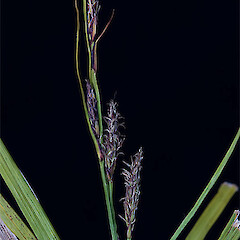Carex sinclairii
Common name
Sinclair’s sedge
Synonyms
None
Family
Cyperaceae
Flora category
Vascular – Native
Endemic taxon
Yes
Endemic genus
No
Endemic family
No
Structural class
Sedges
NVS code
The National Vegetation Survey (NVS) Databank is a physical archive and electronic databank containing records of over 94,000 vegetation survey plots - including data from over 19,000 permanent plots. NVS maintains a standard set of species code abbreviations that correspond to standard scientific plant names from the Ngä Tipu o Aotearoa - New Zealand Plants database.
CARSIN
Current conservation status
The conservation status of all known New Zealand vascular plant taxa at the rank of species and below were reassessed in 2017 using the New Zealand Threat Classification System (NZTCS) – more information about this can be found on the NZTCS website. This report includes a statistical summary and brief notes on changes since 2012 and replaces all previous NZTCS lists for vascular plants.
Please note, threat classifications are often suggested by authors when publications fall between NZTCS assessment periods – an interim threat classification status has not been assessed by the NZTCS panel.
- Conservation status of New Zealand indigenous vascular plants, 2017 . 2018. Peter J. de Lange, Jeremy R. Rolfe, John W. Barkla, Shannel P. Courtney, Paul D. Champion, Leon R. Perrie, Sarah M. Beadel, Kerry A. Ford, Ilse Breitwieser, Ines Schönberger, Rowan Hindmarsh-Walls, Peter B. Heenan and Kate Ladley. Department of Conservation. Source: NZTCS and licensed by DOC for reuse under the Creative Commons Attribution 4.0 International licence.
2017 | Not Threatened
Previous conservation statuses
2012 | Not Threatened
2009 | Not Threatened
2004 | Not Threatened
Distribution
Endemic. New Zealand. North and South Islands from the Waikato River delta and Hauraki Plains south.
Habitat
Coastal to alpine. In freshwater wetlands, under willow in gully systems, along river and stream banks, lake margins, and in damp seepages, pond and tarn margins and clearings within forest. Preferring fertile to mid-fertile wetlands.
Wetland plant indicator status rating
Information derived from the revised national wetland plant list prepared to assist councils in delineating and monitoring wetlands (Clarkson et al., 2021 Manaaki Whenua – Landcare Research Contract Report LC3975 for Hawke’s Bay Regional Council). The national plant list categorises plants by the extent to which they are found in wetlands and not ‘drylands’. The indicator status ratings are OBL (obligate wetland), FACW (facultative wetland), FAC (facultative), FACU (facultative upland), and UPL (obligate upland). If you have suggestions for the Wetland Indicator Status Rating, please contact: [Enable JavaScript to view protected content]
OBL: Obligate Wetland
Almost always is a hydrophyte, rarely in uplands (non-wetlands).
Detailed description
Rhizomatous; tufts ± distant, rather stiff, bright green to bright yellow-green (often with a slight glaucous sheen). Rhizome 2–4 mm diameter, occasionally long-creeping. Culms 40–500 × 0.5–1.5 mm, trigonous, margins faintly scabrid, especially towards inflorescence; basal sheaths grey-brown or reddish brown. Leaves numerous = or > culms, 2–4 mm wide, double-folded, ± erect, rather rigid, margins closely scabrid. Spikes 4–7, all, or at least the lowest, distinctly pedunculate; terminal 1–(2) spikes male, dark brown or occasionally very light brown, the rest female, 15–35 × 3–5 mm, usually dark brown, occasionally branched at base. Glumes ± = utricles, ovate-lanceolate, subacute, truncate, almost emarginate, coriaceous, dark red-brown, almost black, midrib narrow, light yellow-green, extending to the tip or produced beyond to a scarcely scabrid awn usually < 1 mm, but up to 2.5 mm long. Utricle 2.5–3.5 × c. 1.5 mm, plano-convex, ovoid to ovoid-ellipsoid, rather compressed, light yellow-brown to dark brown, with usually 2–5 distinct nerves on each face, occasionally more in larger plants, margins glabrous; tapering gradually above to a beak slightly < 0.5 mm long, orifice entire or minutely bidentate; stipe < 0.5 mm long. Stigmas 2. Nut 1.5–2.0 mm. long, plano-convex, oblong, light brown
Similar taxa
Carex sinclairii can be confused with C. subdola. From that species it is best distinguished by the colour of the mature utricles; those of C. subdola are bright cinnamon-brown, and those of C. sinclairii are yellow-brown to dark brown. Smaller specimens of C. sinclairii have glumes without awns, or scarcely awned, and obovoid utricles with only 2–5 prominent nerves, but larger plants have longer awns in some of the glumes and the utricles are ovoid and tapering with nerves as is usual in C. subdola.
Can also be confused with Carex gaudichaudiana (with which it often co-occurs) when utricle is immature and green. Carex gaudichaudiana is perennial, smaller, and with finer leaves (
Flowering
October–November
Fruiting
November–May
Life cycle
Nuts surrounded by inflated utricles are dispersed by granivory and wind (Thorsen et al., 2009).
Propagation technique
Easily grown from fresh seed and by the division of established plants. Although a wetland species C. sinclairii will grow well in most soils and moisture regimes. Best in partial shade unless grown in permanently damp conditions.
Etymology
carex: Latin name for a species of sedge, now applied to the whole group.
sinclairii: After Sinclair (c. 1796–1861). Colonial Secretary and naturalist.
Where To Buy
Not commercially available.
Attribution
Fact Sheet prepared by P.J. de Lange (110 August 2006). Description adapted from Moore and Edgar (1970)
References and further reading
Moore LB, Edgar E. 1970. Flora of New Zealand, Volume II. Indigenous Tracheophyta: Monocotyledones except Gramineae. Government Printer, Wellington, NZ. 354 p.
Thorsen MJ, Dickinson KJM, Seddon PJ. 2009. Seed dispersal systems in the New Zealand flora. Perspectives in Plant Ecology, Evolution and Systematics 11: 285–309.
NZPCN Fact Sheet citation
Please cite as: de Lange, P.J. (Year at time of access): Carex sinclairii Fact Sheet (content continuously updated). New Zealand Plant Conservation Network. https://www.nzpcn.org.nz/flora/species/carex-sinclairii/ (Date website was queried)








